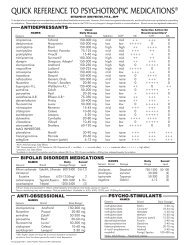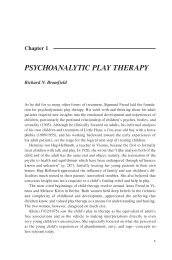IRAQ WAR CLINICIAN GUIDE
Iraq War Clinician's Guide - Network Of Care
Iraq War Clinician's Guide - Network Of Care
Create successful ePaper yourself
Turn your PDF publications into a flip-book with our unique Google optimized e-Paper software.
Iraq War Clinician Guide 190 Appendix J<br />
<strong>WAR</strong>ZONE-RELATED STRESSREACTIONS: WHATVETERANSNEEDTO KNOW<br />
A National Center for PTSD Fact Sheet<br />
JuliaM. Whealin, Ph.13.<br />
Traumas are events in which a person has the feeling that he or she may die or be seriously injured<br />
or harmed, or events in which he or she witnesses such things happeningto others or sees their<br />
effects. Traumatic events are of course common in the war zone, but they are common in the<br />
civilian world too, so that in addition to war zone experiences, many military personnel will have<br />
experienced one or more traumatic events in their civilian lives.<br />
When they are happening, traumas often create feelings of intense fear, helplessness, or horror for<br />
those who experience them. In the days and weeks that follow, they often create longer-lasting<br />
stress reactions that can be surprising, distressing, and difficult to understand. By understanding<br />
their traumatic stress re-actions better, lraq War veterans can become less fearful of them and<br />
better able to cope with them. While reviewing the list of effects of trauma below, keep in mind<br />
several facts about trauma and its effects:<br />
It is very common to have problems following exposure to war or other trauma. But traumatic<br />
stress reactions often become less frequent or distressingas time passes, even without<br />
treatment.<br />
Veterans with PTSD often worry that they are going crazy. This is not true. Rather, what is<br />
happening is that they are experiencing a set of common symptoms and problems that are<br />
connected with trauma.<br />
Problems that result from trauma are not a sign of personal weakness. Many mentally and<br />
physically healthy people experience stress reactions that are distressing and interfere with<br />
their daily life at times.<br />
If traumatic stress reactions continue to cause problemsfor more than a few weeks or months,<br />
treatment can help reduce them.<br />
Traumatic war experiences may cause many of the following kinds of (often temporary) reactions<br />
in veterans:<br />
Unwanted remembering or "re-experiencing." Difficulty in controlling distressing memories of<br />
war is experienced by almost all trauma survivors. Although these memories are upsetting, on the<br />
positive side, these memories mean that a person has a chance to make sense of what has<br />
happened in order to gain mastery over the event. The experience of these memories can include:<br />
unwanted distressing memories as images or other thoughts; feeling like the trauma is happening<br />
again ("flashbacks"); dreams and night-mares; and distress and physical reactions (e.g., heart<br />
pounding, shaking) when reminded of the trauma.<br />
Physicalactivation or "arousal."The body's "fight-or-flight" reaction to a life-threateningsituation<br />
continues long after the event itself. It is upsetting to have your body feel like it is over-reactingor<br />
out of control. Again, on the positive side, these fight-or-flight reactions help prepare a person in a<br />
dangerous situation for quick response and emergency action. Signs of continuing physical<br />
activation, so common following participation in war, can include: difficulty falling or staying<br />
asleep; irritability, anger, and rage; difficulty concentrating; remainingconstantly on the lookout for<br />
-DEPARTMENT OF VETERANS AFFAIRS<br />
NATIONALCENTER FOR PTSD




